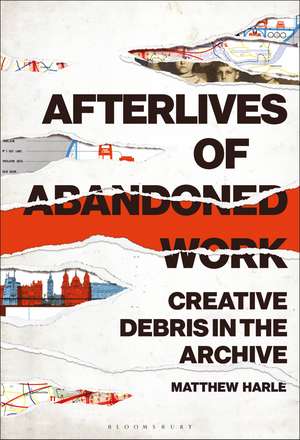Afterlives of Abandoned Work: Creative Debris in the Archive
Autor Dr. Matthew Harleen Limba Engleză Hardback – 26 dec 2018
| Toate formatele și edițiile | Preț | Express |
|---|---|---|
| Paperback (1) | 224.41 lei 6-8 săpt. | |
| Bloomsbury Publishing – 24 iun 2020 | 224.41 lei 6-8 săpt. | |
| Hardback (1) | 775.43 lei 6-8 săpt. | |
| Bloomsbury Publishing – 26 dec 2018 | 775.43 lei 6-8 săpt. |
Preț: 775.43 lei
Preț vechi: 1113.87 lei
-30% Nou
Puncte Express: 1163
Preț estimativ în valută:
148.39€ • 154.05$ • 123.74£
148.39€ • 154.05$ • 123.74£
Carte tipărită la comandă
Livrare economică 22 martie-05 aprilie
Preluare comenzi: 021 569.72.76
Specificații
ISBN-13: 9781501339424
ISBN-10: 1501339427
Pagini: 264
Ilustrații: 43 bw illus
Dimensiuni: 152 x 229 x 19 mm
Greutate: 0.61 kg
Editura: Bloomsbury Publishing
Colecția Bloomsbury Academic
Locul publicării:New York, United States
ISBN-10: 1501339427
Pagini: 264
Ilustrații: 43 bw illus
Dimensiuni: 152 x 229 x 19 mm
Greutate: 0.61 kg
Editura: Bloomsbury Publishing
Colecția Bloomsbury Academic
Locul publicării:New York, United States
Caracteristici
Touches on rarely discussed unfinished projects from major figures including Harold Pinter, Thomas Pynchon, and Muriel Spark
Notă biografică
Matthew Harle is a writer, archive curator and Postdoctoral Research Fellow at the Barbican Centre, UK. His writing has appeared in a number of publications, such as Sight & Sound, Screen, CITY and Cineaste, and he is the co-editor of Of Mud and Flame: A Penda's Fen Sourcebook (2018).
Cuprins
List of IllustrationsAcknowledgments1. On the Shelf: An Introduction to Abandoned Work 2. The Writing and Rewriting of Place: The Story of Llano del Rio3. Town Fictions: Planning the Future in Postwar London 4. A Shattering Achievement: Piecing Together Pinter's Proust5. The Frugal Charade: Ideas for Books in Literary Archives6. Remains to Be Seen: AfterwordBibliographyIndex
Recenzii
One of the foundational manoeuvres of the critical historian of culture is to turn finished works into unfinished ones. Matthew Harle has a head's start here, and he capitalises on it brilliantly revealing the unrealised, the unmade and the abandoned as the ghostly DNA of the cultural sphere.
A glorious typology of the abandoned, failed and unfinished. Matthew Harle enthusiastically traces entropic utopias, ill-advised transport schemes, unraveled cinematic collaborations and unrealised literary projects in a compelling account of the enemies of promise that haunt fallible archives. It is a book that celebrates creative failure and thoughtfully explores the material spaces of incompletion. In a tour de force of intertextuality, it juxtaposes the infinite potential of the unfinished against the mundane inadequacies of the archive. Full of poignant foreclosures, this is a subtle, funny and excitingly original glimpse into the realms of arrested achievement.
Most literary historians discuss abandoned art in doleful, pitying terms. Not Matthew Harle: he sees 'failure' as fertile. In this delightful and whip-smart cultural travelogue, he drifts across the 20th century and the institutions that (sometimes bathetically) try to archive it, offering a series of fascinating meditations on utopian colonies in Los Angeles, postwar British urban planning, Harold Pinter's efforts to bring Proust to the big screen. These projects, in their different ways unfinished and incomplete, emerge as zones of intellectual possibility, conceptual play, infinite and eccentric potential.
A glorious typology of the abandoned, failed and unfinished. Matthew Harle enthusiastically traces entropic utopias, ill-advised transport schemes, unraveled cinematic collaborations and unrealised literary projects in a compelling account of the enemies of promise that haunt fallible archives. It is a book that celebrates creative failure and thoughtfully explores the material spaces of incompletion. In a tour de force of intertextuality, it juxtaposes the infinite potential of the unfinished against the mundane inadequacies of the archive. Full of poignant foreclosures, this is a subtle, funny and excitingly original glimpse into the realms of arrested achievement.
Most literary historians discuss abandoned art in doleful, pitying terms. Not Matthew Harle: he sees 'failure' as fertile. In this delightful and whip-smart cultural travelogue, he drifts across the 20th century and the institutions that (sometimes bathetically) try to archive it, offering a series of fascinating meditations on utopian colonies in Los Angeles, postwar British urban planning, Harold Pinter's efforts to bring Proust to the big screen. These projects, in their different ways unfinished and incomplete, emerge as zones of intellectual possibility, conceptual play, infinite and eccentric potential.
